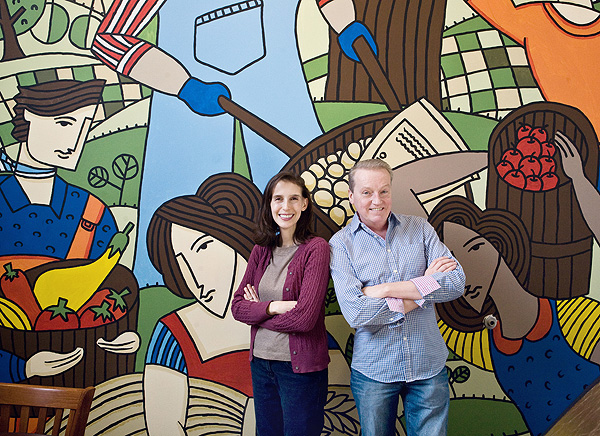Veronica Sterling was out of money, but she needed drugs, so she did the only thing she could think of. She went into T.J. Maxx and slipped clothes into her purse. She’d sell the merchandise later, and then get her drugs. She’d done this before, and though she got caught occasionally, her punishment was never severe. But this time was different. Because of how much she had stolen, Sterling was charged with a felony.
“That just scared the hoot doot out of me when they gave me that six months,” she says. “I knew I was at the end of my rope with all my wrongdoing. I can’t go back to jail a second time. It’s not for me.”
Sterling doesn’t look like a convicted criminal. She’s a 48-year-old grandmother with an edgy haircut and red highlights. Her dainty earrings jingle as she shakes her head back and forth describing the first time she tried drugs. “I was just curious,” she says. “Oh, every time I think about it, I could just beat myself up.” She wrings her hands as she talks about the six of her eight children who were taken from her because of her habit.
But, she says, going to jail changed everything. “That was a blessing. There, I got the help I needed. I prayed. I went to church. I started applying for things so I could be in a different position when I got out.”
That’s when she heard of a former prisoner who got a $14-an-hour job. “Oh, I wish that would be me,” Sterling thought.
Three months after leaving Dawson State Jail near downtown Dallas, Sterling got her wish.
In his weekday suit, cannon flowers looks like a man who worked in corporate finance at Texas Instruments for 23 years, which he did. In his weekend jeans and button-up, he looks like the owner of a coffeehouse, which he is. Flowers is the co-owner of a franchise of It’s a Grind, which operates out of a Deep Ellum apartment complex. Every bit of his slightly graying hair is in place. And though his animated hands speak volumes, his voice barely rises above a whisper.
In his former life at TI, he says, he went to work knowing that his job was to maximize the company’s profits, make money for shareholders. He left in 2002 to became the COO (and now the CEO) of the Human Rights Initiative (HRI), an organization that provides free legal representation and social services to immigrants who have fled persecution. While at HRI, he grew frustrated with the economic hurdles his clients faced. “You help people rebuild their lives, and then they go on into the work sector and then they’re further abused,” he says. He helped people get settled in the Land of Opportunity only to see them get trapped in a cycle of poverty, making minimum wage and unable to afford health insurance. He voiced this frustration to Serena Simmons Connelly, co-founder of HRI and daughter of billionaire Harold Simmons.
“Well, let’s just do like Gandhi,” Connelly said. “Let’s be the change we want to see in ourselves.”
And that’s just what they did.
Together they created the Demeter Project, a real-life experiment in economics. Their question: is it possible to run a profitable business staffed solely with low-skilled workers who earn a living wage and receive affordable health insurance? For the living wage, they relied on the work of Dr. Amy Glasmeier at MIT’s Department of Urban Studies and Planning. Glasmeier put the number at $8.88 for one adult, or $17.03 for one adult with a child. Flowers and Connelly settled on $13.50 for a new employee. And they decided to pay for 75 percent of their workers’ health insurance.
The duo spent seven months looking for the right business to serve as the laboratory for this experiment. They wanted something in the service industry, something that could operate with a low inventory. And it needed to serve the community, be the sort of place where people would hang out. In California, they found It’s a Grind, which has more than 80 stores in 10 states. The husband-and-wife team that ran the company was already paying its employees more than minimum wage, and they loved the idea of the Demeter Project. Beyond the standard 6 percent of revenues they’d collect, they would also get the added marketing benefit of touting the social mission of one of their coffee shops. (Since then, the company was sold to an Australian firm, which is still partnering with the Demeter Project.)
Flowers and Connelly invested about $600,000 in the shop. They painted the walls in muted yellows and purples. They hung photos of Eric Clapton and Bob Dylan. They created a cozy nook with a fireplace. Then they found their employees. They worked with groups such as HRI, Grace Unlimited, and New Friends New Life, an organization that helps women transition to life after prostitution. The only stipulation: people who’d committed violent crimes were not eligible for hire.
On November 16, 2008, It’s a Grind opened.
A typical business runs on a 20 to 30 percent profit margin. But paying higher wages and providing health insurance meant Flowers would have to lower that target. He figured the shop could hit a 2 to 3 percent margin. While Flowers won’t provide detailed information about the store’s performance, he says some of the numbers are encouraging. From 2009 to 2010, sales at the store increased 60 percent. But It’s a Grind has yet to turn a profit. And so far Connelly and Flowers have put $1 million of their own money into the Demeter Project. They’ve committed to financing the project for at least two more years.
“From the business school perspective, which continues to focus on the bottom line, that’s where I’m struggling,” Flowers says. Making the Demeter Project a nonprofit would make things simpler, but he’s not inclined to take the easy route. “As long as you’re a nonprofit, you can go pay people’s insurance and do everything else and just write another grant for it. If you’re really going to reinvent the workplace, you’ve got to play with the big guys.”
Beyond the bottom line, It’s a Grind faces the unique challenge of managing a staff with checkered pasts. Debra, for instance, was an employee with a history similar to Sterling’s. She worked at the store for a while. But then, one day, she stopped showing up. Flowers had to accept that she had returned to her former life.
“I truly assumed that she had invested as much into the relationship as I had,” he says. “For someone to return back to what they had come out of, that took a lot to understand.”
Six months later, though, Debra returned. She said, “Cannon, I am not here to say anything to you other than I’m sorry.” Then she warned him that she wouldn’t be the only person to do what she did. “If you save four out of 10, then be happy with four out of 10,” she said. Out of the 25 employees involved in the Demeter Project since its inception, Debra is the only one who has left under such circumstances.
Flowers isn’t fazed. His piercing blue eyes sparkle as he talks about his employees and the intellectual curiosity he has for the experiment. He says when his business is judged on a triple bottom line, which takes into account the size of their carbon footprint and financial profitability and social enhancement of both the employees and the community, It’s a Grind looks like a very successful business.
Carlos Guerrero, the store’s general manager, worked for corporate restaurants for more than 25 years before joining the Demeter Project. The greatest difference for him is the personal relationships he has with his employees. “You help them not only in their jobs, but in their personal lives,” he says. “Usually, in the corporate world, you leave your personal problems at home.” Though his workforce is made up of convicted felons and refugees, he says it’s like any other workplace. As the employees get to know each other, they become their own support network.
But the question remains: is the Demeter Project a viable model? RafiQ Salleh, owner of Chill Bubble Tea, thinks so. Salleh is Flowers’ life partner. So, of course, he has to be supportive. But he has also partnered with the Demeter Project and is paying his employees a livable wage.
For his part, Flowers is determined. “This is the right thing to do,” he says. “It’s going to work.”
For Sterling, It’s a Grind has already worked. She now has support, growing relationships with her children, and she’s looking forward to the future. She is working toward her GED and hopes that one day she can fulfill her lifelong dream of being a secretary. Other employees have gone on, too. One is now a certified yoga instructor. She sends regular updates from Seattle. Another is now in school at New York University, creating social enterprises.
Sterling says she, too, will move on. But she wants to make sure It’s a Grind is around for other people like her. “The people that have fallen down need a little picking up,” she says. “There are a lot of things that I can’t start over. But this is one thing that I can say I’ve been blessed with.”
Write to [email protected].






